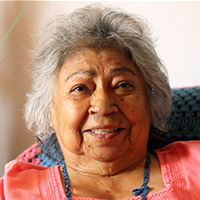Sign up to take the first challenge!
New challenges launched each week.
MY CHALLENGE
I challenge you to learn about the Indigenous languages that are from the place where you live. Explore online resources related to the language, learn how to say “hello” and then introduce yourself to us on social media with the hashtag #WelcomingIndigenousLanguages!
About This Challenge
The dominant narrative surrounding Indigenous languages in Canada is one of decline and loss; we’re so used to hearing that a particular language has only a few fluent speakers left or only a few Elders who remember hearing the language. However, the truth about Indigenous languages is they’re on the rise. More than ever, Indigenous youth, families, and students are interested in the languages that their family spoke or currently speaks. However, in order for these languages to thrive once more on these territories and to become accessible to Indigenous and non-Indigenous learners, Indigenous languages need both popular and institutional support and protection.
Indigenous people had to hide their languages and the perspectives, worldviews and knowledge systems that the languages contain. For so many years, the languages were hidden and protected; some were lost, some are only now being found again, and some are starting to once more thrive upon these territories. As individuals, we can support Indigenous languages by welcoming them into our lives, utilizing the resources that already exist to learn these languages, and provide support for additional resources to be created and made accessible.
Why?
For so many generations learning, speaking or passing on languages Indigenous in Canada was a crime. In Residential Schools, generations of Indigenous youth were subjected to severe punishment and humiliation for speaking or practicing their languages - so much so that even outside of Residential School many were unwilling or unable to pass their knowledge of the language on to their own families. Some feared that their children would be punished or otherwise targeted for their accents or for speaking the languages in mainstream Canada, and others simply did not know the languages anymore in order to pass them on.
It’s important to remember that while many consider Indigenous languages to be central to Indigenous cultures, Indigenous people were purposefully, systematically, and violently separated from their languages. It’s not uncommon for Indigenous individuals to be uncomfortable speaking or sharing their language, or to not have any understanding of their language at all. Any conversation about or including Indigenous languages, must include an understanding of colonization, Residential Schools and the ongoing impacts of systems like it.
Indigenous and non-Indigenous people who have access and the ability to learn Indigenous languages should be rightly celebrated and supported for this - however there are so many Indigenous people who yearn to know their language but who are unable to access the resources needed to do so. As a country, we choose what we protect, prioritize and celebrate within our culture, let’s choose to uplift Indigenous languages. You can do your part by utilizing and showing support for the Indigenous language resources that already exist and show support for those people and organizations that are passing this important learning on.
To begin, click "accept challenge" below!
Additional Resources
- Canada Needs Thriving Indigenous Languages | Khelsilem | TEDxWestVancouverED
- This MP wants Indigenous languages to be official in Canada | Your Morning
- Huffington Post Article on endangered Indigenous Languages in Canada
- Apps For Learning An Indigenous Language - Animikii Indigenous Technology
- Why Indigenous languages should be taught alongside French and English - Maclean’s
- Should non-Indigenous Canadians learn Indigenous languages?
- First Voices
- Mapping Indigenous languages in Canada - Canadian Geographic
- Indigenous languages—Learning and teaching resources - Government of Canada
- CBC News: Liberal MP delivers statement in Mohawk in House of Commons
Join others who have
accepted this challenge.
ACCEPT CHALLENGE

Shirley Williams was born and raised in Wikwemikong on Manitoulin Island and now resides in Peterborough. She received her B.A. in Native Studies from Trent University. She received her diploma in Native Language Instructor's Program, Lakehead University and did her M.A. at York University on Environmental Studies on Language and Culture on Manitoulin Dialect. Shirley has lectured across Ontario promoting Nishnaabe language and Culture.
"It's really good to introduce yourself in the language because it's a sign of respect. We need to respect each others' dialects, we need to respect the languages of this world."

